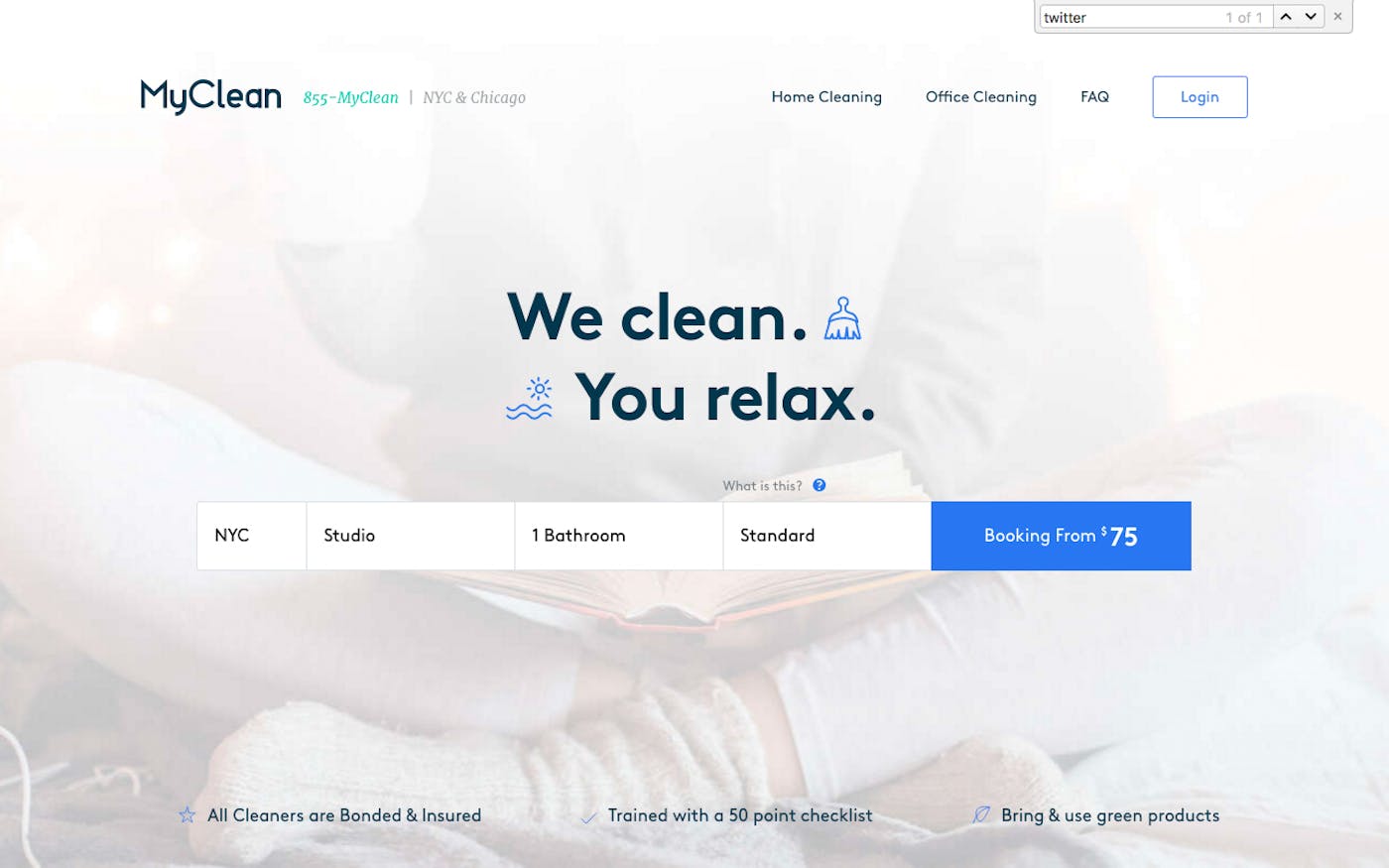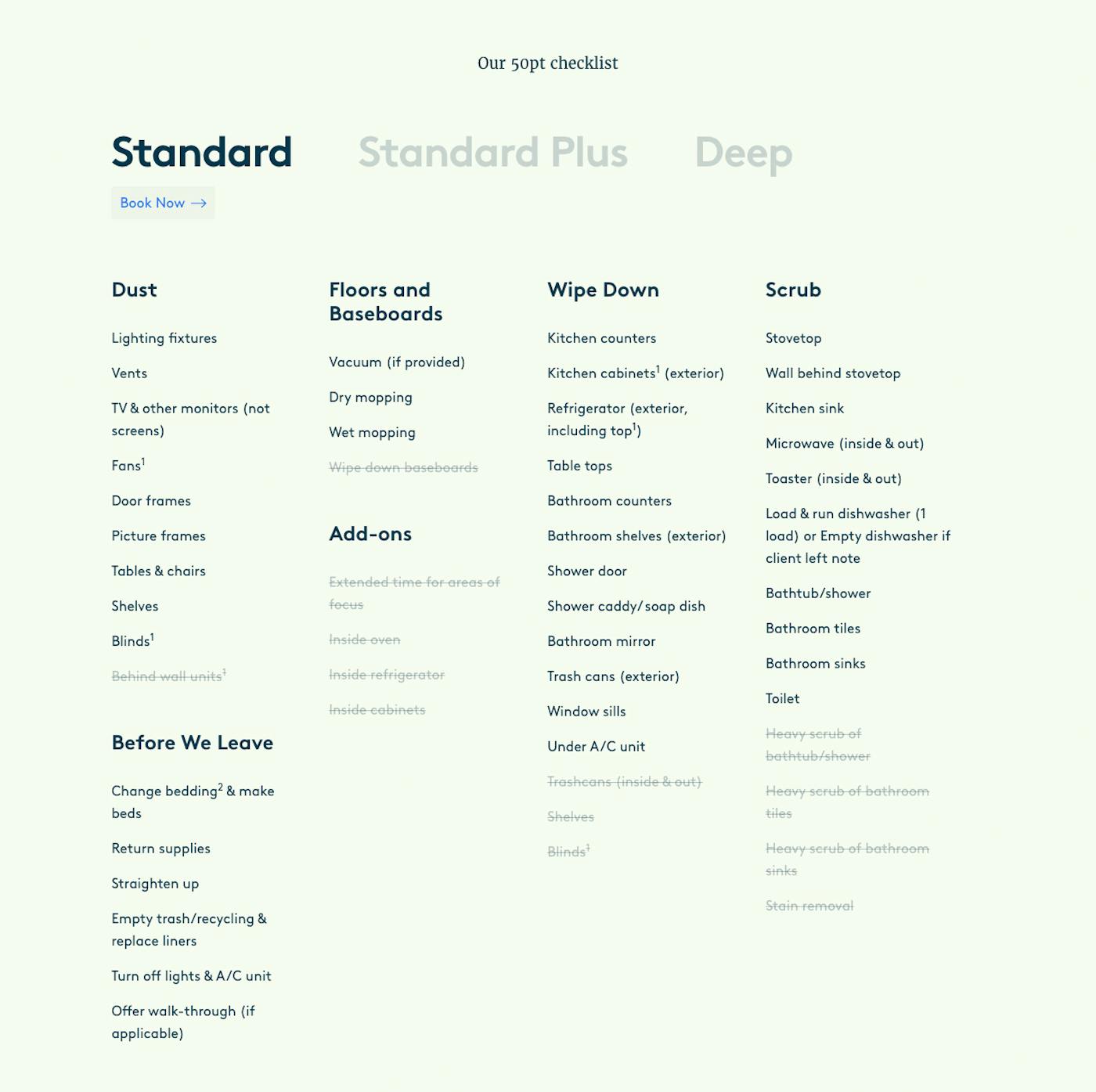Growing to $750k/mo by Ignoring VC Pressure to Grow
Rapidly
Hello! What's your background, and what are you working on?
Hi, I'm Michael Scharf, the CEO of MyClean, Inc. My background is in finance — specifically, structured derivative sales. After doing that for several years, I realized I wanted to join the real world as an entrepreneur instead of just selling complex financial products to finance people.
MyClean provides top notch residential and commercial cleaning in NYC and Chicago, while providing sustainable careers for our team. Some people (including many of the guys I used to work with) questioned my career shift back in 2009. Since then, we have proven the doubters wrong.
MyClean is now doing $9M in revenue per year in two cities and employs 200 people, many of whom were unemployed before we found them!
How'd you come up with the idea for MyClean?
The idea was simple: I wanted to get my apartment cleaned without having to find a friend who "had someone," without having to leave cash on the mantle, without worrying about damage or theft, and with the ability to provide feedback.
When we started, that simply didn't exist. I was the target customer! A young, upper-middle income professional who wanted a cleaning but didn't know where to get one. We launched with that thought in mind.
What went into building the initial product, and how has it changed since?
When I made the switch, the world was still digging out of the 2008-2009 financial crisis that centered largely on bond securities. Fortunately, I had been diligent in saving for the proverbial rainy day, which afforded me the flexibility to take this shot.
One of the key decisions we made was to outsource the development of our website, so we could focus our energy on marketing and customer retention. At first, our site was very simple. You could go online, book a cleaning at a given time, and we would send a cleaner. It took about $20,000 and 9 months to get up and running. Remember, this was 2009 and we had no idea what we were doing 😊

Initially, we found sub-contractors to do the cleaning. However, two years in we realized we were churning customers too quickly, and I identified quality as the issue. We quickly learned that to ensure quality and consistency, we needed to hire and train our own staff.
At that point, I met Kenny Schultz, our COO. He had a vision for the hiring, training, and tracking of our cleaning staff. Five years later, we are 200 cleaners and two cities strong.
What strategies have you used to attract users and grow MyClean?
It is always prudent to have more than one way to acquire customers. At MyClean, we have four. Derrick Shich, our head of product, helps to ensure that we acquire profitable customers through each channel, and that they provide a cohesive message to our potential customers. Said differently, we want people to hear the same great and accurate things no matter where they go.
Initially, our clients came through organic searches of websites like Google. We didn't do much advertising.
Once we got the cleaning right (around 2011) it was time to do so some paid advertising. One lesson we have learned in this area is that acquiring customers is easy, but acquiring customers you want is a bit trickier.
Throwing up a Google ad offering a $49 cleaning will get customers in the door. However, we soon learned that these customers were not often willing to pay our (still discounted) price for regular service after the initial teaser.
Right now, our paid ads focus on retargeting (customers who have found us before) and public review sites like Yelp. These customers have shown a clear intention to purchase, and quality is important to them. That's our sweet spot. If a client doesn't care if the job is done right, we might not be the service for them.
We also rely on organic public review sites to drive traffic. This requires active management of our online reputation. This starts with doing a great job and addressing all concerns in a timely and professional manner. At MyClean, we get it right or we make it right! The ethos shines through in our public reviews (currently 4.5 stars on Yelp).
Finally, we rely on word of mouth. We do a great job, and people tell their friends! We encourage this through our refer-a-friend program, offering $50 for every referral. People are always looking for good cleaners, and word of mouth is a cheap and effective way to get great customers. The hard part (as we figured out all those years ago) is earning that word of mouth!
How does your business model work?
Our business model is pretty simple. We acquire customers online, then do a good job so our profits exceed the cost of acquisition. We then hope to pair our customers with a regular cleaner for their subscription.
As I mentioned above, we started with an "Uber for Cleaning" model, but outsourcing our cleaners to attend to our customers' needs quickly proved to be a failure, resulting in a series of one-star reviews on Yelp and a whole bunch of un-scalable business problems. When we pivoted, we converted our cleaners from outsourced 1099 contract workers to full-time W-2 time employees.
Our cleaners are all now fully trained to deliver on MyClean's 50 Point Checklist and receive an array of afforded benefits, like health insurance, paid sick leave, workers comp and 401(k) options. By treating our employees well, we're ultimately servicing our customers too — even if this means that our prices are 10%-20% higher than our competitors who contract their cleaners.

Customers can choose between a Standard, Standard Plus, or Deep cleaning.
In the future we plan to grow and expand our NYC and Chicago businesses, to expand into other markets, and then eventually to diversify our revenue streams. We currently have a bunch of ideas in the product development phase.
What are the biggest challenges you've faced and obstacles you've overcome?
Our biggest challenge was learning how to scale the business from both a marketing and operations perspective. For marketing, it's about how can you acquire the largest possible number of profitable LTV (lifetime value) clients relative to your CAC (cost to acquire a customer). For operations, it's how to grow a staff that's held accountable to the MyClean standard.
What lessons have you learned, and what advice do you have for aspiring indie hackers who are just starting out?
Pick a market where you know demand exists. Prior to launching MyClean, there were members on our team who'd had the same cleaning lady stop by once a week for 6 years. While giving a copy of a key, leaving money out on the table and not really being able to communicate due to a language barrier was fine at the time, we knew there had to be a better, more efficient way.
Remember your core vision, but don't be afraid to pivot based on what your clients are telling you. Our initial vision was one of a technology company that was creating an engine that would allow customers to book, pay, and communicate online. However, our customers were telling us that while they liked the convenience of being able to book online, the overall service was not up-to-par. We therefore knew we had to pivot and become a cleaning service that hires, trains, and manages its cleaners.
Trust your gut when it comes to outside capital and other major business decisions. Starting in 2012, we saw the rise of "Uber for X" companies and the home services space became a "hot sector." Over the next three years we would see two competitors raise $64M and $110M in VC funding respectively, and a handful of others who raised anywhere from $2M-$10M. At one point we were receiving inquiries from a new venture capital fund nearly every day. They all wanted to "invest" and "scale" my business with "hockey stick growth." However, we knew that the "Uber for X" model did not work in the cleaning space due to the quality control issues we experienced early on. We also knew that VCs who are looking for a 10x return on their investment in five to seven years had a different vision of what "scale" meant than we did. We therefore have never and will likely never take on venture capital.
Put people first. It sounds simple, but so many business leaders miss this point in their quest for global domination. Our core focus at MyClean is to: Create and keep happy homes for our clients while building sustainable careers for our team. The only way that is possible is by keeping the best interests of our employees and customers at the heart of every decision.
Where can we go to learn more?
Check out our website at myclean.com, or leave a comment below. My username is MyCleanMike on the Indie Hackers forum.

i know justin khan open a bussines like that and after a year he closed the bussiness ...
Mike, I loved this interview. This trend we see today of growing as fast as possible with no profit on the premisse of having an exit later that might be worth it leaves me wondering if that's a healthy model to pursue or not. This interview shed some light in it.
That said, I have two questions:
1.) You said
I figure that most of those competitors who raised money are failing now? Would you consider VC funding if you were envisioning an exit?
2.) Still related to the question above, 250 employees is quite a lot. Even if you still have more equity in the company by turning down VCs, how much of those $9M are profits that you can build personal wealth with (vs re-investing that into the business without aiming for an exit)?
Michael, did you talk to a lot of customers to determine that contractors and quality were the big problem in the initial model, or did you come about this a different way?
What are your thoughts on Yelp and how it affects your business?
Hello, we started out contracting to local services and then pivoted. This was when we were about 18 months old and doing around $60k per month in monthly revenue.